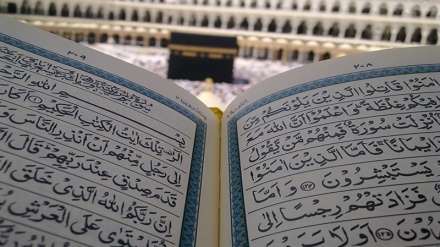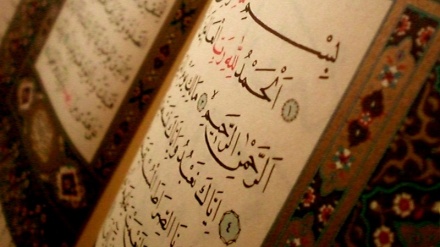Path towards Enlightenment (1011)
Welcome to our weekly episode of “Path towards Enlightenment”, which is an endeavour to make you and us familiar with an easy and fluent explanation of God’s Final Scripture to all mankind, the holy Qur’an that was revealed to the Last and Greatest of all Messengers, Prophet Muhammad (blessings of God upon him and his progeny).
A fortnight ago, we completed explanation of “Surah Munafiqoun” and this Friday we embark on explanation of the next Surah, that is, “Surah Taghabun”, which is number 64 in the serial order of compilation of the holy Qur’an.
Revealed in Medina it has 18 Ayahs and takes its name from the word “Youm at-Taghabun” in Ayah 9, which means “the Day of Mutual Loss and Gain” and refers to the Day of Resurrection and Judgement as the Day of Dispossession, since on that day everyone will try to save oneself and put the blame on others. For those who abandon faith and choose to disbelieve shall lose Paradise and be thrown into Hellfire, cheated forever from felicity by their own souls and their leaders. Those who believe shall gain Paradise against all the attempts of the unbelievers to distract them in the world from faith and goodness, because of their guidance by God and His messengers to steer away from Hellfire. The Surah opens with a description of God’s Majesty, Power, Wisdom, and Knowledge. It reminds the disbelievers of the miserable end of those who disbelieved before them and decisively refutes their denial of the Resurrection. The Surah urges the believers to be wary but forgiving of the enemies they may have within their own families and inspires them to remain steadfast and to spend in God’s cause.
According to a narration from the Prophet’s Sixth Infallible Heir, Imam Ja’far Sadiq (AS), whoever recites Surah Taghabun in the ritual prayer as a part of religious obligations or on other occasions, will be amongst the people of Paradise on the Day of Resurrection, depending on fulfillment of Qur’anic and Islamic injunctions.
Now we invited you to listen to the opening two Ayahs of the Surah.
“In the Name of God, the All-Compassionate, the All-Merciful. Whatever there is in the heavens and whatever there is in the earth glorify Allah. To Him belongs all sovereignty and to Him belongs all praise, and He has power over all things.
“It is He who created you; then some of you are faithless and some of you are faithful; and Allah sees best what you do.”
This Surah like some other ones begins with glorification and praise of the One and Only Creator of the universe, to whom belongs all praise and power, Who is glorified by each and everything. In other words, He is the Sovereign glorified by all the world of existence and He never wrongs anyone, however, it is unfortunate that some peopled, failing to worship and glorify God Almighty, commit sins and indulge in disbelief.
Ayah 2 means to say that God has granted the human race the freedom of will and expression, which stem from the gifts of intellect and the power of speech, in order to differentiate good from evil and act accordingly. This Ayah negates the flawed concept of predestination by focusing on faith and disbelief, through which stems a person’s words and deeds. Allah is fully aware of what we do.
These Ayahs teach us that:
- The entire creation, including animals, plants and even inanimate objects possess understanding, and thus they glorify the Almighty Creator.
- Ingratitude and disbelief are the result of inadequate cognizance of God, or the complete lack of it.
- The Almighty Creator has power over all and everything.
- God has granted human beings the freedom to differentiate between right and wrong, as thus the consequences of their words and actions rest upon them.
Now let us listen to Ayahs 3 and 4 of the same Surah:
“He created the heavens and the earth with reason, and He formed you and perfected your forms, and toward Him is the destination.
“He knows whatever there is in the heavens and the earth, and He knows whatever you hide and whatever you disclose, and Allah knows best what is in the breasts.”
These two Ayahs further elaborate the purpose of creation of the universe, which is based on reason and is proceeding towards the single goal of the Boundless Being, that is, the Infinite existence of God, as could be reflected by the forms given to us with the objective of achieving perfection. The creation of human beings as the best of creation inspires us to proceed from the realm of the horizons and enter that of the souls, saying that God fashioned us with pleasing shapes, pleasant appearances and an embellished heart enlightened by reason and wisdom. As Imam Ali ibn Abi Taleb (AS), the Vicegerent of the Prophet of Islam says in one of his sermons, that God Almighty created specimens from the entire world of existence in the human beings, which means macrocosm is epitomized in microcosm. In other words, a brief glimpse at the creation of our body and soul reflects that the human being is the most beauteous of all the creatures in the world of existence and God created this being in the best form and the Almighty Creator’s Omnipotence is manifest therein. Ayah 3 closes by saying that the final return of all things is toward God Almighty. Man is a constituent element of the organic world of existence.
The best means to abstain from committing sins and maintaining the Fear of God Almighty is the concept of His Omniscience and the fact that our beloved Creator is fully aware of all our deeds. He is All-Aware of all that is manifest and hidden throughout the heavens and on the earth, even in our hearts and minds.
From these ayahs we learn that:
- The creation of the universe is not haphazard and unplanned, but rather in accordance with specific aim.
- Everything moves towards the Boundless Being of the Almighty Creator and encompassed by His Infinite Power.
- God is aware of our secret deeds and hidden intentions and motives.
- It is proper cognizance of God that prevents us from committing sins and inspires us to do good deeds.
AS/MG


